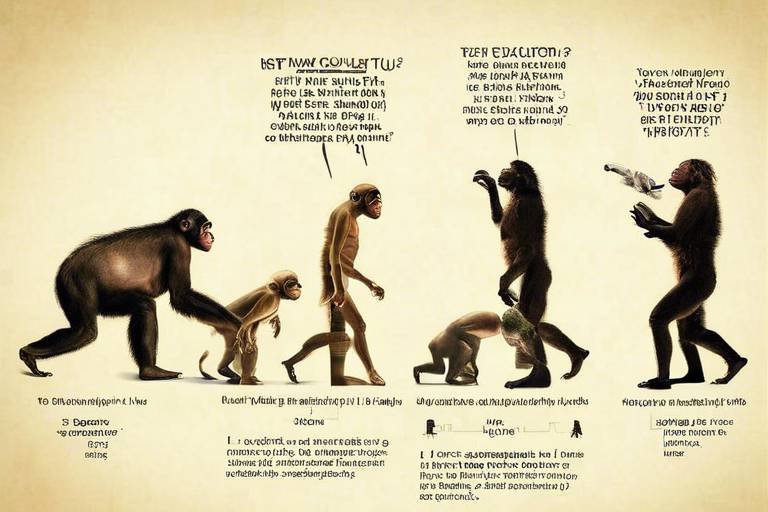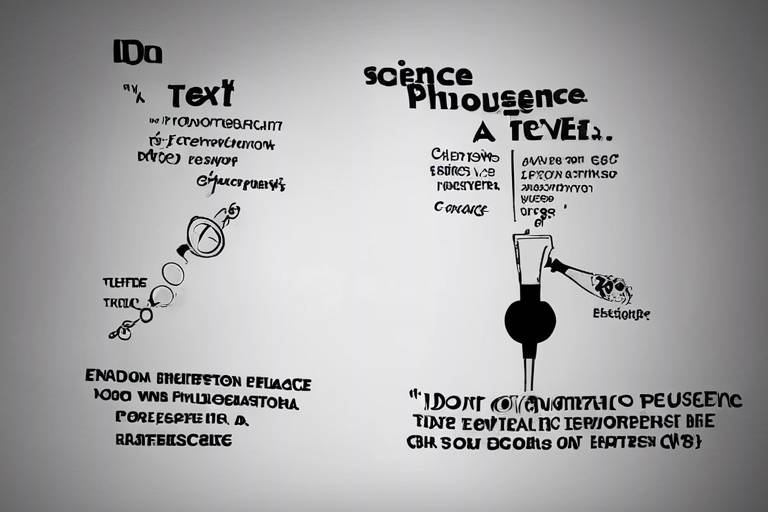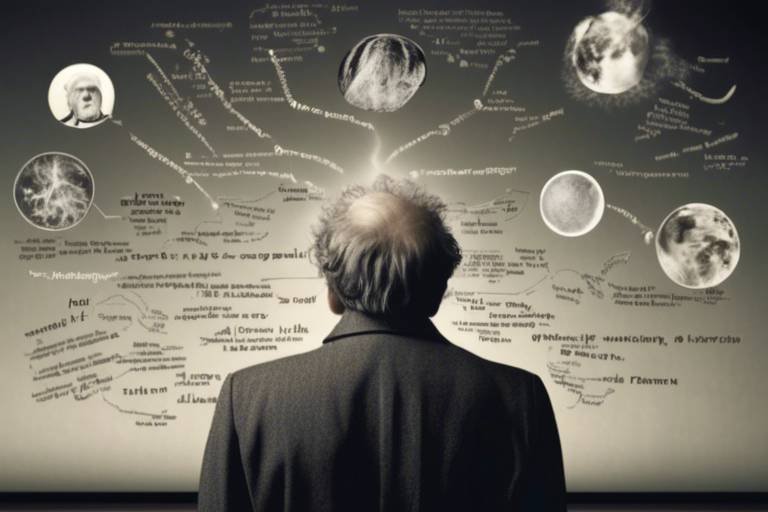How Philosophy has Shaped Neurosciences
The relationship between philosophy and neuroscience is as intricate and fascinating as the human brain itself. At first glance, one might wonder how abstract thoughts and ethical inquiries can have any bearing on the hard sciences that study our neural pathways. However, upon closer examination, it becomes clear that philosophy has profoundly influenced the evolution of neuroscience, shaping the questions we ask and the methods we employ to unveil the mysteries of the mind. This article delves into this captivating intersection, exploring how philosophical thought has not only informed neuroscientific theories but also how it continues to challenge and refine our understanding of consciousness, identity, and the very essence of being human.
To truly appreciate the impact of philosophy on neuroscience, we must first take a stroll down memory lane. The historical relationship between these two disciplines is rich and layered, dating back to ancient civilizations. Philosophers like Socrates, Plato, and Aristotle laid the groundwork for understanding the mind and its functions long before the advent of modern science. Their inquiries into the nature of existence, thought, and perception set the stage for later scientific exploration. Fast forward to the Enlightenment, where thinkers like René Descartes introduced ideas that would resonate through centuries of scientific inquiry. Descartes famously posited the dualism of mind and body, suggesting that the mind is a non-physical entity that interacts with the physical body. This notion sparked debates that continue to this day, influencing how neuroscientists approach the study of consciousness and the brain.
As we delve deeper into the philosophical concepts that have shaped neuroscience, two major schools of thought emerge: dualism and materialism. These concepts are not merely academic; they have real implications for how we understand the mind-brain relationship. Dualism, which posits that the mind and body are separate, raises questions about the nature of consciousness and whether it can be fully explained by physical processes. On the other hand, materialism argues that everything about the mind can be understood through the lens of physical science, as the brain is the seat of all mental activity. This ongoing tug-of-war between these perspectives has fueled countless debates within both philosophy and neuroscience.
Let's take a closer look at these two perspectives. Dualism presents a compelling argument for the existence of a non-material mind. Think of it as the classic struggle between the ghost in the machine and the machine itself. This view suggests that our thoughts, emotions, and consciousness cannot be entirely reduced to neural activity. In contrast, materialism asserts that our experiences are the products of biochemical processes and neural connections. This perspective encourages researchers to focus on the brain's physical structure and functions, leading to groundbreaking discoveries in neuroscience.
René Descartes' contributions to the mind-body problem are monumental. He famously stated, "I think, therefore I am," emphasizing the importance of thought as proof of existence. Descartes believed that the mind and body interact through the pineal gland, a notion that, while scientifically outdated, still resonates in discussions about consciousness today. His dualistic view paved the way for future philosophers and scientists to grapple with the complexities of identity and self-awareness, ultimately influencing contemporary neuroscience's approach to studying consciousness.
In recent decades, materialism has gained significant traction in neuroscience. With advancements in neuroimaging and other technologies, researchers are increasingly able to correlate specific brain activities with thoughts, emotions, and behaviors. This shift has led to a more mechanistic view of the brain, where understanding neural processes is seen as key to unlocking the secrets of the mind. However, this rise of materialism also raises profound questions: Can we truly capture the essence of consciousness through mere physical measurements? Or is there more to our subjective experiences than what can be quantified?
As neuroscience continues to uncover the workings of the brain, it challenges long-held philosophical views. For example, discoveries about the neural basis of decision-making prompt us to reconsider our notions of free will and morality. If our choices are rooted in neural processes, what does that say about personal responsibility? These questions invite a re-evaluation of ethical frameworks and encourage ongoing dialogue between philosophers and neuroscientists.
With great power comes great responsibility, and the field of neuroscience is no exception. As advancements in neurotechnology and brain enhancement become more prevalent, ethical considerations come to the forefront. Philosophical ethics provides a crucial lens through which we can examine these issues, helping us navigate the murky waters of what is right and wrong in the realm of brain science.
Enter neuroethics, a burgeoning field that addresses the ethical dilemmas posed by advancements in neuroscience. This discipline merges philosophical inquiry with scientific exploration, focusing on questions like: Should we enhance human cognition through technology? What are the implications of manipulating memories? Neuroethics encourages a thoughtful examination of the potential consequences of neuroscientific research, ensuring that ethical considerations keep pace with technological advancements.
The philosophy of mind plays a pivotal role in bridging the gap between abstract thought and empirical research. By examining concepts like consciousness, perception, and the subjective experience of reality, philosophers contribute to a deeper understanding of neural processes. This collaboration fosters a richer dialogue between disciplines, encouraging scientists to consider the implications of their findings on our understanding of what it means to be human.
Looking ahead, the relationship between philosophy and neuroscience appears more promising than ever. As both fields continue to evolve, we can anticipate new areas for collaboration and exploration. Philosophical inquiry will undoubtedly continue to shape neuroscientific research, prompting us to ask deeper questions about the nature of consciousness and identity. The future is bright, and the dialogue between these two disciplines will likely lead to groundbreaking discoveries that enhance our understanding of the human experience.
- How does philosophy influence neuroscience?
Philosophy provides foundational concepts and ethical frameworks that guide neuroscientific inquiry, helping shape the questions researchers ask about the mind and brain. - What is dualism?
Dualism is the philosophical view that the mind and body are distinct entities, leading to debates about the nature of consciousness and identity. - What is neuroethics?
Neuroethics is a field that addresses the ethical implications of advancements in neuroscience and neurotechnology, focusing on questions of morality and responsibility. - How do recent discoveries in neuroscience challenge traditional philosophical views?
Recent findings about the neural basis of decision-making and consciousness prompt reevaluation of concepts like free will and personal responsibility.

The Historical Context of Philosophy and Neuroscience
The relationship between philosophy and neuroscience is rich and intricate, dating back centuries. To fully grasp how these two fields have intertwined, we must journey back to their origins, where philosophical inquiries laid the groundwork for what would eventually evolve into modern scientific approaches. The early philosophers were not merely thinkers; they were the pioneers exploring the depths of the human mind and the nature of existence. Their questions about consciousness, perception, and reality were the seeds from which neuroscientific inquiry would later sprout.
In ancient times, philosophers like Socrates and Plato began to ponder the essence of the mind and its relationship to the body. Plato, for instance, posited that the mind was a separate entity from the body, a notion that would later be echoed in the dualistic theories of the Renaissance. This early separation of mind and body set the stage for centuries of debate, influencing not just philosophy but also the scientific exploration of the brain and its functions.
Fast forward to the Enlightenment period, where thinkers like René Descartes took the philosophical discourse to new heights. Descartes famously declared, "Cogito, ergo sum" (I think, therefore I am), highlighting the significance of thought in understanding existence. His exploration of the mind-body interaction introduced a framework that would challenge and inspire neuroscientific thought for generations. Descartes viewed the mind as a non-physical substance that interacted with the physical body, a perspective that sparked ongoing debates about the nature of consciousness and identity.
As we moved into the 19th century, the rise of empiricism and the scientific method began to shift the landscape. Philosophers like John Locke and David Hume emphasized observation and experience as the foundations of knowledge, paving the way for a more empirical approach to studying the mind. This period saw the emergence of psychology as a distinct discipline, which would eventually merge with neuroscience as we know it today.
By the 20th century, the relationship between philosophy and neuroscience became increasingly complex. The development of new technologies and methodologies allowed scientists to explore the brain's inner workings more deeply. Philosophers began to engage with neuroscientific findings, questioning how these discoveries impacted traditional philosophical concepts like free will, morality, and the nature of consciousness. This interplay between the two fields has led to a dynamic dialogue that continues to evolve.
In summary, the historical context of philosophy and neuroscience is a testament to the enduring quest for understanding the human experience. The philosophical inquiries of the past have not only influenced the development of neuroscientific theories but have also shaped the very questions we ask about the mind and its relationship to the body. As we continue to unravel the mysteries of the brain, the collaboration between these two fields promises to yield even greater insights into the nature of consciousness and the human condition.
- What is the relationship between philosophy and neuroscience? Philosophy provides foundational questions and frameworks that guide neuroscientific inquiry, while neuroscience offers empirical data that can challenge or support philosophical theories.
- How did early philosophers influence modern neuroscience? Early philosophers introduced key concepts about the mind and body that shaped the questions and methodologies of later scientific exploration.
- What role does ethics play in the intersection of philosophy and neuroscience? Ethical considerations are crucial in addressing the implications of neuroscientific advancements, particularly in areas like neurotechnology and mental health interventions.

Key Philosophical Concepts Influencing Neuroscience
The relationship between philosophy and neuroscience is deeply intertwined, with key philosophical concepts playing a crucial role in shaping our understanding of the brain and mind. At the heart of this relationship lies the ongoing debate between dualism and materialism, two philosophical perspectives that have significantly influenced neuroscientific research and theories. These concepts not only inform our understanding of consciousness but also challenge us to consider the implications of scientific findings on our notions of identity and self.
Dualism, often associated with the ideas of René Descartes, posits that the mind and body are distinct entities. This perspective raises profound questions about how mental states, such as thoughts and emotions, interact with physical processes in the brain. For instance, if the mind is non-physical, how can it affect bodily functions? This conundrum has led to extensive philosophical inquiries and has prompted neuroscientists to seek explanations that bridge the gap between subjective experiences and objective brain activity.
On the flip side, materialism argues that everything about the mind can be explained through physical processes. This view has gained traction in contemporary neuroscience, where researchers increasingly focus on understanding how neural mechanisms correlate with cognitive functions. The rise of neuroimaging techniques, such as fMRI and PET scans, has provided empirical evidence supporting materialist perspectives by allowing scientists to observe brain activity associated with various mental states.
To illustrate the contrast between these two views, consider the following table:
| Concept | Dualism | Materialism |
|---|---|---|
| Definition | Mental and physical are distinct | Mental processes arise from physical brain activity |
| Key Proponent | René Descartes | Modern neuroscientists |
| Implications | Challenges in explaining mind-body interaction | Supports a scientific approach to understanding consciousness |
The implications of these philosophical concepts extend far beyond academic debates; they influence how we perceive ourselves and our behaviors. For example, if we lean towards a dualist perspective, we might regard our thoughts and feelings as separate from our biological makeup, potentially leading to a sense of autonomy over our actions. Conversely, a materialist viewpoint might suggest that our decisions are merely the result of neural processes, challenging our understanding of free will.
Moreover, as neuroscience continues to uncover the complexities of the brain, it often confronts traditional philosophical views. Recent discoveries about the neural basis of decision-making and emotional responses invite us to reconsider our assumptions about morality and personal responsibility. If our choices are deeply rooted in brain activity, what does that mean for concepts like accountability and ethical behavior? These questions highlight the dynamic interplay between philosophy and neuroscience, urging us to explore how philosophical inquiry can enrich our understanding of neuroscientific findings.
As we navigate through these philosophical waters, it becomes clear that the dialogue between philosophy and neuroscience is not just an academic exercise. It has real-world implications that affect how we understand ourselves, our relationships, and the ethical frameworks within which we operate. The ongoing exploration of these concepts will undoubtedly continue to shape the future of both fields.
- What is dualism? Dualism is the philosophical view that the mind and body are distinct and separate entities.
- How does materialism differ from dualism? Materialism posits that everything about the mind can be explained through physical processes in the brain, while dualism maintains that mental states are non-physical.
- Why are these concepts important in neuroscience? They influence how researchers interpret brain activity and understand the relationship between mental processes and biological functions.

Dualism vs. Materialism
When we delve into the fascinating debate between dualism and materialism, we’re essentially exploring two distinct lenses through which to view the mind-brain relationship. Dualism, famously championed by René Descartes, posits that the mind and body are separate entities. This perspective suggests that our thoughts, emotions, and consciousness exist independently from the physical brain. Imagine, if you will, a stage play: the brain is the stage itself, while the mind is the performance happening atop it, seemingly detached from the structure beneath.
On the other hand, materialism argues that everything about the mind can be explained through physical processes. In this view, our thoughts and feelings are simply byproducts of neural activities. Think of it as a complex machine, where every cog and gear (or neuron and synapse) plays a crucial role in producing the final output: our conscious experience. This perspective has gained traction in modern neuroscience, especially as advancements in technology allow us to observe brain activity in real-time.
The clash between these two philosophies has profound implications for how we understand consciousness. For instance, consider the following points:
- Consciousness: Dualists argue that consciousness cannot be fully explained by physical processes, while materialists believe that all aspects of consciousness arise from brain activity.
- Identity: Dualism raises questions about personal identity and the soul, whereas materialism focuses on the biological basis of identity.
- Free Will: The dualist perspective often supports the notion of free will, while materialism may suggest that our choices are predetermined by neural processes.
As we navigate through these philosophical waters, it's essential to recognize that both dualism and materialism contribute valuable insights to our understanding of the mind. The ongoing dialogue between these perspectives not only enriches philosophical discourse but also informs neuroscientific research. By examining the mind through these contrasting viewpoints, we can better grasp the complexities of consciousness and the human experience.
- What is dualism? Dualism is the philosophical view that the mind and body are distinct and separate entities.
- What is materialism? Materialism is the belief that everything, including consciousness, is a result of physical processes in the brain.
- How do dualism and materialism differ in their views on consciousness? Dualism suggests that consciousness exists independently of the brain, while materialism views it as a product of brain activity.
- Can dualism and materialism coexist? While they are opposing views, some argue that elements of both can coexist, leading to a more nuanced understanding of the mind.

René Descartes and Mind-Body Interaction
René Descartes, often hailed as the father of modern philosophy, made significant contributions to the understanding of the mind-body relationship. His famous declaration, "Cogito, ergo sum" (I think, therefore I am), encapsulates his belief in the primacy of thought and consciousness as fundamental to human existence. Descartes proposed a dualistic view of reality, suggesting that the mind and body are distinct entities that interact with one another. This idea fundamentally shaped philosophical inquiry and laid the groundwork for future discussions in neuroscience.
In Descartes' framework, the mind is a non-physical substance that engages with the physical body, primarily through the pineal gland, which he believed to be the seat of the soul. This interaction raises intriguing questions about how mental states can influence physical actions and vice versa. For instance, when you feel an emotion—like joy or sadness—how does that intangible feeling translate into a physical response, such as smiling or crying? Descartes' exploration of this interaction opened the door for further investigation into the complexities of consciousness and identity.
Despite the advancements in neuroscience, the mind-body problem remains a central topic of debate. Modern neuroscience has made strides in mapping brain functions and understanding neural processes, yet the question of how subjective experiences arise from these physical interactions persists. Descartes' dualism has faced criticism, especially from proponents of materialism who argue that everything, including consciousness, can be explained through physical processes alone. This ongoing dialogue reflects the tension between philosophical thought and scientific inquiry, highlighting how Descartes’ ideas continue to resonate in contemporary discussions about consciousness.
To better illustrate Descartes' influence, consider the following table that summarizes key aspects of his dualistic theory and its implications:
| Aspect | Descartes’ View | Implications |
|---|---|---|
| Nature of Mind | Non-physical substance | Challenges the notion of a purely physical explanation for consciousness |
| Nature of Body | Physical substance | Encourages scientific exploration of brain function and behavior |
| Interaction | Pineal gland as the point of interaction | Stimulates inquiry into how mental and physical states influence each other |
In conclusion, Descartes’ exploration of mind-body interaction has left an indelible mark on both philosophy and neuroscience. His ideas not only prompted a deeper investigation into the essence of consciousness but also encouraged a dialogue that persists to this day. As we continue to unravel the mysteries of the brain, the philosophical inquiries sparked by Descartes remind us that the relationship between mind and body is as complex as it is fascinating.
- What is the mind-body problem? The mind-body problem explores the relationship between mental states and physical processes, questioning how they interact and influence each other.
- How did Descartes influence modern neuroscience? Descartes' dualistic theory prompted ongoing debates about consciousness and identity, influencing both philosophical and scientific inquiries into the nature of the mind.
- What is dualism? Dualism is the belief that the mind and body are distinct entities that interact, a concept popularized by Descartes.

Contemporary Materialism in Neuroscience
In the vibrant tapestry of neuroscience, contemporary materialism stands as a dominant thread, weaving together our understanding of the brain and its functions. This philosophical stance posits that everything about the mind can ultimately be explained through physical processes and brain activity. Imagine, if you will, the brain as a complex machine, where every thought, feeling, and behavior is a result of intricate gears turning within. This perspective has significantly influenced research methodologies, guiding scientists to focus on measurable, observable phenomena rather than abstract concepts.
As neuroscience has advanced, the materialist viewpoint has gained traction, leading to a plethora of groundbreaking discoveries. For instance, consider the following key areas where contemporary materialism has made its mark:
- Neuroimaging Techniques: Innovations such as fMRI and PET scans allow researchers to visualize brain activity in real-time, providing a direct window into the neural correlates of mental processes.
- Neurotransmitter Studies: Understanding the roles of various neurotransmitters has unveiled how chemical interactions in the brain influence mood, cognition, and behavior.
- Neural Plasticity: The recognition that the brain is not static but can change and adapt in response to experiences has reshaped our understanding of learning and recovery from injury.
This materialist approach has not only transformed the methodologies employed in neuroscience but has also shifted the interpretations of neural processes. For instance, researchers now often approach questions about consciousness, emotions, and decision-making through the lens of brain activity and structure. This has led to a more empirical understanding of what it means to be human, emphasizing that our thoughts and actions are deeply rooted in biological processes.
However, the rise of contemporary materialism is not without its challenges. Critics argue that this perspective may overlook the richness of subjective experience and the complexities of consciousness. They ask: can we truly reduce the depth of human experience to mere neural activity? This ongoing debate fuels discussions in both philosophy and neuroscience, encouraging researchers to explore not only the 'how' but also the 'why' behind our mental lives.
In summary, contemporary materialism has undeniably shaped the landscape of neuroscience, providing a robust framework for understanding the brain. Yet, as we continue to unravel the mysteries of the mind, it remains crucial to balance this materialist perspective with considerations of subjective experience and the philosophical implications of our findings. The interplay between these domains will undoubtedly enrich our understanding of what it means to think, feel, and exist.

Philosophical Implications of Neuroscientific Discoveries
As we delve into the fascinating world of neuroscience, we quickly encounter a myriad of discoveries that challenge our traditional philosophical beliefs. It's like opening a Pandora's box of questions that make us rethink our understanding of concepts such as free will, morality, and the very essence of consciousness. Imagine standing at the edge of a vast ocean, where each wave represents a new scientific finding that crashes against the shores of our philosophical foundations. What does it mean for our sense of self when neuroscience suggests that our thoughts and actions are deeply rooted in neural processes?
Recent discoveries in neuroscience have sparked intense debates about the nature of free will. Are our choices truly our own, or are they merely the result of complex neural mechanisms operating beyond our conscious awareness? This question echoes the age-old philosophical dilemma of determinism versus libertarianism. Neuroscientific research, particularly studies involving brain imaging, has shown that decisions may be initiated in the brain before we are even aware of them. This revelation raises profound questions: If our decisions are predetermined by brain activity, what does that say about our responsibility for our actions? Are we merely puppets dancing to the tune of our neural wiring?
Moreover, the implications extend into the realm of morality. Neuroscience has begun to uncover the neural correlates of moral decision-making, suggesting that our moral judgments might be influenced by biological factors. For instance, studies have shown that damage to certain brain areas can impair moral reasoning, leading to a reevaluation of how we understand moral culpability. If our moral choices are shaped by our brain's physical state, can we still hold individuals accountable for their actions? This intersection of neuroscience and ethics invites a reexamination of justice and punishment, pushing us to consider whether we should treat criminal behavior as a moral failing or a neurological disorder.
Furthermore, the exploration of consciousness remains one of the most perplexing challenges at the crossroads of philosophy and neuroscience. Despite significant advancements in understanding brain functions, the question of how subjective experiences arise from neural activity remains largely unanswered. This is akin to trying to explain the beauty of a sunset by merely describing the chemical reactions in the atmosphere. Philosophers and neuroscientists alike grapple with the "hard problem" of consciousness, which questions how and why we have qualitative experiences. This ongoing inquiry invites a rich dialogue, as philosophical perspectives can help frame the questions we ask in neuroscience, while scientific discoveries can refine our understanding of philosophical concepts.
In summary, the philosophical implications of neuroscientific discoveries are profound and far-reaching. They challenge our notions of free will, morality, and consciousness, urging us to reconsider what it means to be human in an age where science continues to unveil the intricacies of the brain. As we navigate these waters, it is essential to maintain an open dialogue between philosophy and neuroscience, allowing each discipline to inform and enrich the other. After all, the quest for understanding is a journey best taken together.
- What is the relationship between neuroscience and philosophy? Neuroscience studies the brain and nervous system, while philosophy explores fundamental questions about existence, knowledge, and ethics. Together, they examine how our understanding of the mind and behavior is shaped.
- How do neuroscientific discoveries challenge the concept of free will? Research suggests that decisions may be made unconsciously before we are aware of them, raising questions about the extent of our control over choices.
- What role does morality play in neuroscience? Neuroscience investigates the brain's role in moral decision-making, prompting discussions about accountability and the nature of moral judgments.
- What is the "hard problem" of consciousness? This term refers to the difficulty in explaining how subjective experiences arise from neural processes, a central question in both philosophy and neuroscience.

Ethical Considerations in Neuroscience
As the field of neuroscience rapidly advances, it brings with it a plethora of ethical considerations that demand our attention. The intersection of neuroscience and ethics is not just a theoretical exercise; it has real-world implications for individuals and society as a whole. Imagine a world where we can enhance cognitive abilities or manipulate memories—sounds like science fiction, right? Yet, these possibilities are becoming more tangible with developments in neurotechnology. This leads us to ponder critical questions: What are the ethical boundaries of such technologies? and How should we navigate the moral landscape of brain enhancement?
At the heart of these discussions lies the concept of neuroethics, a burgeoning field that addresses the ethical, legal, and social implications of neuroscience. Neuroethics challenges us to consider the ramifications of our growing understanding of the brain. For instance, should we allow for cognitive enhancements in healthy individuals? What happens to our notion of personal identity if we can alter memories or emotions at will? These questions are not merely academic; they touch on fundamental aspects of what it means to be human.
Moreover, ethical considerations in neuroscience extend to issues of informed consent. When conducting research, particularly with vulnerable populations, it is crucial that participants fully understand the implications of their involvement. This includes potential risks and benefits, as well as how their data will be used. The challenge lies in ensuring that consent is truly informed and not just a formality. In the age of complex neuroscientific methods, how can we guarantee that participants grasp the intricacies of brain imaging or genetic testing?
Another critical area of concern is the potential for discrimination based on neuroscientific findings. As we uncover more about the brain and its functions, there is a risk that this knowledge could be misused. For example, if certain brain patterns are associated with specific behaviors or mental health conditions, could this lead to stigmatization or discrimination in employment or insurance? It’s a slippery slope that raises alarms about privacy and the misuse of neuroscientific data.
To further illustrate the ethical landscape, consider the following table that outlines key ethical dilemmas in neuroscience:
| Ethical Dilemma | Description |
|---|---|
| Brain Enhancement | The use of technology to improve cognitive functions raises questions about fairness and access. |
| Memory Manipulation | Altering or erasing memories could impact personal identity and autonomy. |
| Neuroscientific Research | Ensuring informed consent and ethical treatment of research subjects is paramount. |
| Data Privacy | Protecting sensitive brain data from misuse or exploitation is a growing concern. |
As we delve deeper into these ethical considerations, it is essential to foster a dialogue among neuroscientists, ethicists, policymakers, and the public. This collaborative approach can help establish guidelines that not only advance the field of neuroscience but also protect individual rights and societal values. The future of neuroscience is not just a matter of scientific progress; it is also about navigating the moral complexities that come with it.
- What is neuroethics? Neuroethics is a field that examines the ethical, legal, and social implications of neuroscience.
- Why is informed consent important in neuroscience? Informed consent ensures that research participants understand the risks and benefits of their involvement, protecting their autonomy.
- How can neuroscience affect personal identity? Advances in neuroscience, such as memory manipulation, could alter how we perceive our identities and experiences.
- What are the risks of cognitive enhancement? Cognitive enhancement raises concerns about fairness, access, and the potential for misuse of neuroscientific knowledge.

Neuroethics: A New Field of Study
As neuroscience continues to advance at a breakneck pace, a new field has emerged that seeks to address the ethical dilemmas posed by these scientific developments: neuroethics. This interdisciplinary domain combines insights from both neuroscience and philosophy, aiming to navigate the complex moral landscape that arises from our growing understanding of the brain. Imagine being handed the keys to a powerful vehicle; while the potential for speed and efficiency is exhilarating, it also comes with a responsibility to drive safely and ethically. In a similar vein, neuroethics encourages us to consider the implications of our newfound capabilities in understanding and manipulating the human mind.
Neuroethics is not merely an academic exercise; it has practical implications in various fields, including mental health, neurotechnology, and brain enhancement. As we delve deeper into the neural mechanisms of thought, emotion, and behavior, questions arise about the morality of intervening in these processes. For instance, should we enhance cognitive abilities through neurotechnological means? What are the implications for personal identity and autonomy? These are not just philosophical musings; they are pressing concerns for researchers, clinicians, and society at large.
One of the core issues in neuroethics is the concept of informed consent. As neuroscientific techniques become more sophisticated, ensuring that individuals fully understand the risks and benefits of participating in research or treatment becomes increasingly complex. The challenge lies in communicating intricate scientific concepts in a way that is accessible and comprehensible. This is akin to trying to explain the intricacies of a complex machine to someone who has never seen one before; it requires patience, clarity, and a commitment to transparency.
Furthermore, neuroethics also grapples with the implications of neuroimaging and other diagnostic tools that can reveal intimate details about a person's mental state. For example, if a brain scan indicates a predisposition to a certain mental illness, how should that information be used? Should it be disclosed to the individual, or could it lead to discrimination and stigmatization? These ethical quandaries highlight the need for a framework that balances the benefits of neuroscience with the rights and dignity of individuals.
In essence, neuroethics serves as a guiding compass in the rapidly evolving landscape of neuroscience. It encourages us to ask the difficult questions and to consider the broader implications of our scientific pursuits. By engaging in this dialogue, we can strive to ensure that our advancements in understanding the brain are accompanied by a commitment to ethical responsibility. Just as a ship needs a captain to navigate through turbulent waters, the field of neuroethics helps steer neuroscience toward a future that respects human dignity and promotes the well-being of all.
As we continue to explore the intersections of neuroscience and ethics, it becomes clear that the dialogue between these fields is not only necessary but vital. The challenges posed by neuroethics will require collaboration among scientists, ethicists, policymakers, and the public. Only through this collective effort can we hope to harness the power of neuroscience for the greater good while safeguarding the values that define our humanity.
- What is neuroethics? Neuroethics is an interdisciplinary field that addresses the ethical implications of neuroscience research and its applications.
- Why is informed consent important in neuroscience? Informed consent ensures that participants understand the risks and benefits of research, promoting autonomy and ethical standards.
- How does neuroethics impact mental health treatments? Neuroethics examines the moral considerations surrounding the use of neurotechnological interventions in treating mental health conditions.
- What are the main ethical concerns in neuroimaging? Concerns include privacy, potential misuse of information, and the implications of revealing predispositions to mental illness.

Philosophy of Mind and Neuroscience
The philosophy of mind and neuroscience are two fascinating fields that, when intertwined, offer profound insights into the nature of consciousness, perception, and our subjective experience of reality. At their core, they both seek to answer some of humanity's most pressing questions: What is the mind? How does it relate to the brain? And what does it mean to be conscious? These inquiries have persisted through centuries, evolving alongside our understanding of the brain's complexities.
One of the most intriguing aspects of this intersection is how philosophical theories have historically shaped neuroscientific research. For instance, the concept of functionalism—a theory in the philosophy of mind that considers mental states in terms of their functional roles—has significantly influenced how neuroscientists approach the study of mental processes. This perspective encourages researchers to look beyond the physical structure of the brain and consider the functions and processes that contribute to our cognitive abilities.
Moreover, the subjective experience—often referred to as qualia—poses a unique challenge for both philosophers and neuroscientists. How can we scientifically measure something as intangible as the feeling of seeing a vibrant sunset or tasting a delicious meal? This question leads us to explore the limitations of current neuroscientific methods and the philosophical implications of these limitations. As we delve deeper into the neural correlates of consciousness, we must also confront the philosophical dilemmas that arise from our findings.
In recent years, advancements in neuroimaging technologies, such as fMRI and EEG, have allowed scientists to visualize brain activity in real-time, providing a wealth of data on how different brain regions contribute to various cognitive functions. However, while these tools have revolutionized our understanding of the brain, they also raise critical questions about the interpretation of this data. For example, can we truly claim to understand consciousness simply by observing brain activity? Or is there an essential aspect of the mind that remains elusive to scientific inquiry?
The ongoing dialogue between philosophy and neuroscience is crucial for addressing these questions. Philosophers provide frameworks that help interpret neuroscientific data, while neuroscientists offer empirical evidence that can either support or challenge philosophical theories. This dynamic relationship can be seen in debates surrounding topics such as free will and moral responsibility. As neuroscientific research continues to explore the mechanisms behind decision-making and behavior, philosophers must reassess traditional views on agency and accountability.
Ultimately, the philosophy of mind enriches our understanding of neuroscience by prompting critical reflections on the implications of scientific findings. As we continue to unravel the mysteries of the brain, the collaboration between these two fields will be essential in navigating the ethical and existential questions that arise from our expanding knowledge. This synergy not only enhances our comprehension of the mind-brain relationship but also deepens our appreciation for the complexities of human experience.
- What is the philosophy of mind? The philosophy of mind is a branch of philosophy that studies the nature of the mind, mental events, and consciousness, often exploring the relationship between the mind and the brain.
- How does neuroscience relate to philosophy? Neuroscience provides empirical data about brain function, while philosophy offers frameworks and theories that help interpret this data, particularly concerning consciousness and mental states.
- What are qualia? Qualia are the subjective, qualitative properties of experiences, such as the redness of red or the sweetness of sugar, which pose challenges for scientific measurement.
- Can neuroscience explain consciousness? While neuroscience can identify neural correlates of consciousness, the full nature of consciousness remains a philosophical question that is still under debate.

The Future of Philosophy and Neuroscience
The relationship between philosophy and neuroscience is poised for exciting developments in the coming years. As our understanding of the brain deepens, philosophical inquiries will likely evolve alongside neuroscientific advancements. This synergy could lead to groundbreaking insights into the nature of consciousness, identity, and the very essence of what it means to be human. Imagine standing at the edge of a vast ocean, where the waves of knowledge from both fields crash together, creating new shores of understanding.
One potential area for collaboration is in the realm of consciousness studies. Neuroscience has made significant strides in mapping brain activity and understanding how various neural processes correlate with conscious experience. However, the philosophical questions surrounding the subjective nature of consciousness—such as the qualia experience—remain largely unresolved. As neuroscientists gather more data, philosophers can offer frameworks for interpreting these findings, ultimately enriching our understanding of the mind.
Moreover, the rise of artificial intelligence (AI) and its implications for both fields cannot be overlooked. As machines become increasingly capable of mimicking human cognitive functions, philosophical debates about the nature of mind and intelligence will intensify. Are these AI systems truly conscious, or are they merely simulating human thought? This question not only challenges our understanding of consciousness but also raises ethical considerations about the rights and responsibilities we have towards sentient machines.
Additionally, the field of neuroethics will continue to grow as advancements in neuroscience present ethical dilemmas that require philosophical scrutiny. Issues surrounding brain enhancement, mental health interventions, and the potential misuse of neurotechnology will demand a collaborative approach between neuroscientists and ethicists. By engaging in dialogue, both disciplines can work towards establishing guidelines that prioritize human dignity and ethical integrity in the face of rapid technological change.
In summary, the future of philosophy and neuroscience is not merely a continuation of past dialogues; it is an invitation to explore uncharted territories. As we stand on the brink of new discoveries, the questions we ask today will shape the narratives of tomorrow. Will we unlock the secrets of consciousness? Can we ethically navigate the complexities of neurotechnology? These questions will not only define the future of neuroscience but will also challenge our philosophical frameworks, pushing the boundaries of what we know about ourselves.
- How will advancements in neuroscience influence philosophical thought?
Advancements in neuroscience will provide new data and perspectives, prompting philosophers to reevaluate and refine existing theories about the mind, consciousness, and identity. - What role does neuroethics play in the future of neuroscience?
Neuroethics will be crucial in addressing the ethical implications of new technologies and treatments, ensuring that scientific progress aligns with societal values and human rights. - Can artificial intelligence be considered conscious?
This question remains a hot topic in both philosophy and neuroscience, as researchers explore the differences between human consciousness and machine intelligence.
Frequently Asked Questions
- How has philosophy influenced the development of neuroscience?
Philosophy has played a crucial role in shaping the foundational concepts of neuroscience. Early philosophical inquiries into the nature of the mind and consciousness laid the groundwork for scientific exploration. Think of it like a roadmap—philosophy provides the directions, while neuroscience fills in the details with empirical evidence.
- What are the key philosophical concepts affecting neuroscience?
Two major philosophical concepts that have significantly impacted neuroscience are dualism and materialism. Dualism posits that the mind and body are separate entities, while materialism argues that everything, including consciousness, is a product of physical processes. These differing viewpoints spark ongoing debates about how we understand the mind-brain relationship.
- What is the mind-body problem?
The mind-body problem explores the relationship between mental states and physical states. It questions how our thoughts and feelings relate to our brain's physical processes. This conundrum has puzzled philosophers like René Descartes, who famously suggested that the mind interacts with the body, a notion that still resonates in today’s discussions about consciousness in neuroscience.
- How do recent neuroscientific discoveries challenge traditional philosophical views?
Recent advancements in neuroscience have prompted us to rethink concepts like free will and morality. For instance, findings related to brain activity before conscious decision-making raise questions about whether we truly have control over our actions. It’s like discovering that the puppet strings of our thoughts might be pulled by unseen forces!
- What ethical considerations arise from advancements in neuroscience?
As neuroscience progresses, ethical dilemmas emerge, particularly concerning neurotechnology and brain enhancement. Questions about privacy, consent, and the potential for misuse of brain-altering technologies are at the forefront. Philosophical ethics guides these discussions, helping us navigate the complex moral landscape of modern neuroscience.
- What is neuroethics?
Neuroethics is a burgeoning field that addresses the ethical implications of neuroscience and neurotechnology. It examines questions about the moral responsibilities of neuroscientists and the societal impacts of their discoveries. Think of it as the ethical compass guiding the ship of scientific exploration!
- How does the philosophy of mind relate to neuroscience?
The philosophy of mind delves into understanding consciousness, perception, and subjective experiences, providing a philosophical framework for interpreting neural processes. It helps bridge the gap between abstract thought and tangible brain activity, offering insights into how our minds work and how they are connected to our physical selves.
- What does the future hold for the relationship between philosophy and neuroscience?
The future of philosophy and neuroscience looks promising, with potential collaborations that could enhance our understanding of the mind and brain. As both fields continue to evolve, philosophical inquiry may lead to new questions and methodologies in neuroscience, fostering a dynamic interplay that enriches both disciplines.



















